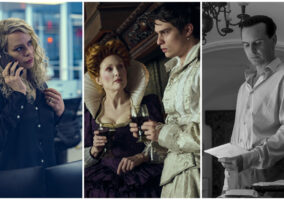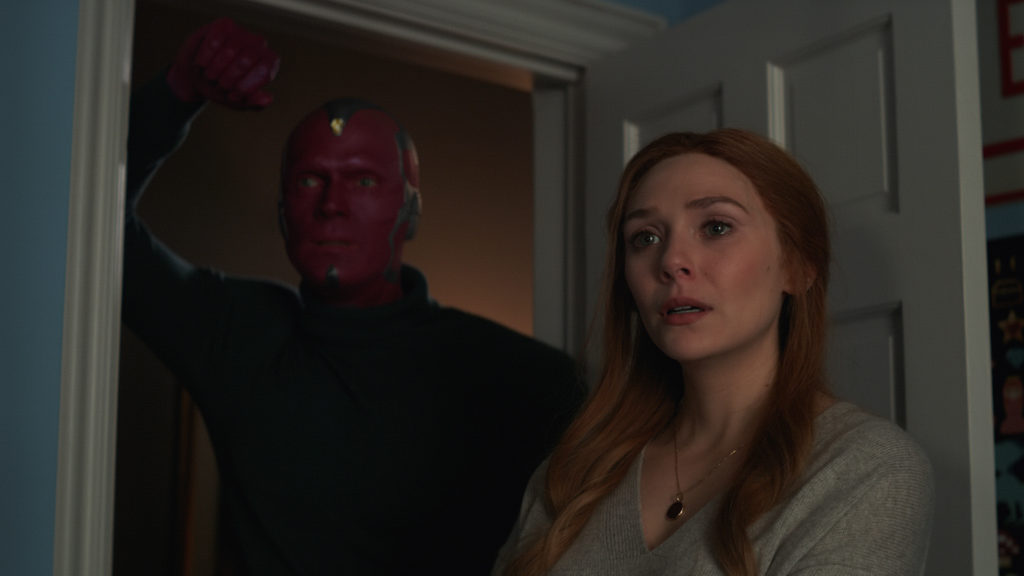
It sure will be interesting to see how this all shakes out. Not the fate of Wanda Maximoff after the events of WandaVision (although there’s certainly a lot there to keep anyone tantalized). No, we mean we’re waiting to see what the response is going to be to this finale. All the fans who got caught up in the drama, emotion and mystery of Disney+’s not-so-surprise hit WandaVision wanted was for poor Wanda to get her happy ending. Instead, she got the only ending any of us should have expected, given her place in the largest entertainment franchise of all time: no ending at all.
To borrow a line from a completely different comic book universe, when it comes to the Marvel Cinematic Universe, “Nothing ever truly ends.” It was written in stone before the first scene was shot that the last scenes were going to leave the audience hanging. To borrow yet another phrase from yet another franchise, “This is the way.” Given the nature of Marvel adaptations and how they’ve all been bleeding into each other for well over a decade, we probably got the best, most definitive sort of ending possible for this tale, but it will be interesting to see what kind of backlash this finale may inspire, since there’s something of a history of shows with excited and engaged online fandom getting raked over the coals for not sticking the landing.
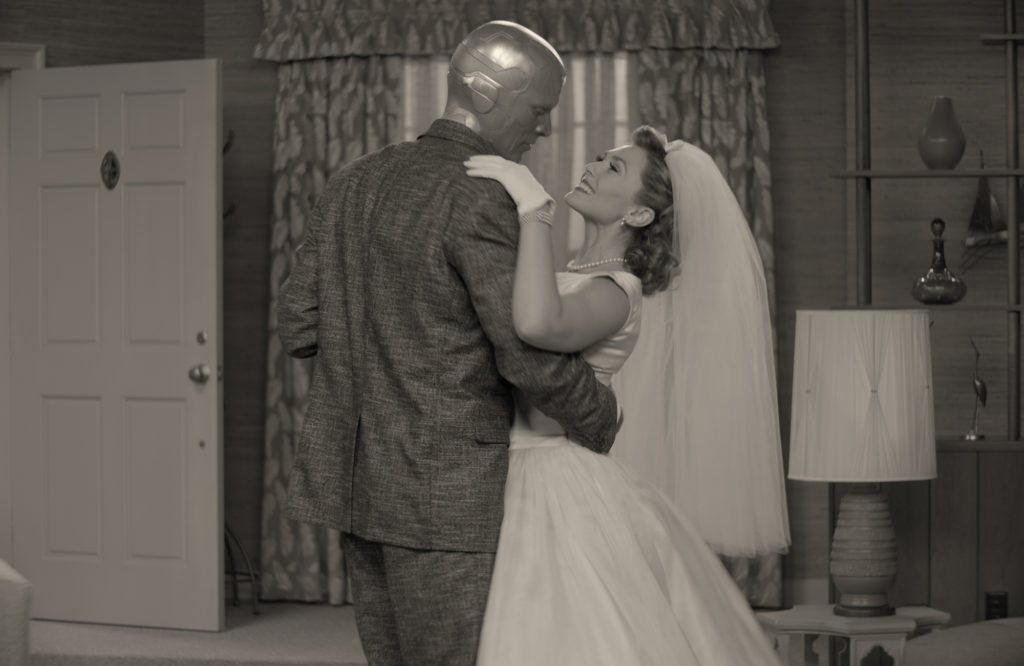
It’s also been interesting watching some culture critics struggle their way through talking about WandaVision. As is the way of any mass entertainment that reaches “virtual water cooler” levels of gleeful discussion, there was a bit of a backlash in recent weeks to some of the more rapturous responses to the instantly viral moments or the well-crafted emotionally manipulative ones. Without overstating things too much (because despite what some more excited reviewers might have suggested, WandaVision is neither Ibsen nor Lynchian in tone or quality), it felt like quite a few of them couldn’t bring themselves to say that a Disney series based on the extremely popular Marvel Cinematic Universe franchise had real quality, artistic purpose and more depth than one normally expects. We’re not being smug here. Despite Tom being a superhero comic fan of many, many decades, even we have to struggle with whether we’re overpraising the show. It’s hard to reconcile a show that offers a rather delicate and nuanced portrayal of grief and depression with a show that has fighting robots and cars flying through the air at the end of it.
But regardless of whether there’s agreement on, for instance, the relative quality of a line like “But what is grief, if not love persevering?” there’s no denying it resonated strongly with a huge audience at a time of intense worldwide anxiety, depression, and loss. By happy (for Disney) happenstance, a series about a woman stuck in a reality she can’t escape because she’s crippled by depression and using television shows to self-soothe instantly resonated with a worldwide audience after a full year of pandemic-induced social distance. That isn’t to say that WandaVision wasn’t a huge creative triumph as well as a not-inconsiderable risk for a well-oiled franchise that had become formulaic in its success. No, it doesn’t surpass The Leftovers (to which it is probably too-often compared) in quality, but it’s okay to recognize that the concept was fresh, the scripts were sharp, funny and poignant, the art direction, costume design and visual pastiche work were all some of the best in recent television, and the cast was excellent, even if it’s all part of a massive entertainment complex that tends to inspire a rabidly devoted fandom through fireworks and fan service. Director and Executive Producer Matt Shakman and showrunner and creator Jac Schaeffer infused the show with a great love of television history and a consummate showperson’s sense of how to string an audience along. It’s okay to say they deserve Emmy consideration for the work they’ve done here, just as it’s okay to say that several of the performances were worthy of awards consideration. The Marvel merry-go-round scooped up two of the best actors in its stable and added a third player so perfectly suited to the job that her career probably just took a huge leap forward. Elizabeth Olsen, Paul Bettany and Kathryn Hahn all did remarkable work and the series would never have worked without the combination of the three of them. Kat Dennings and Randall Park were perfect in every scene and Teyonah Parris is on the verge of becoming the next Marvel superstar with her upcoming turn in the second Captain Marvel film, where she will no doubt slap Brie Larson in the face with her new powers because there are clearly some unresolved issues there. Evan Peters gave a truly fun performance, and in retrospect, did a pretty great job of capturing the essence of Kathryn Hahn as her mind-controlled minion, but it turned out to be the ultimate in stunt casting; designed to lead the show’s fandom, recappers and reviewers to a false conclusion specifically because of his presence in the cast. They could have cast any actor in that part to tell the same story. Which leads us to our next point.
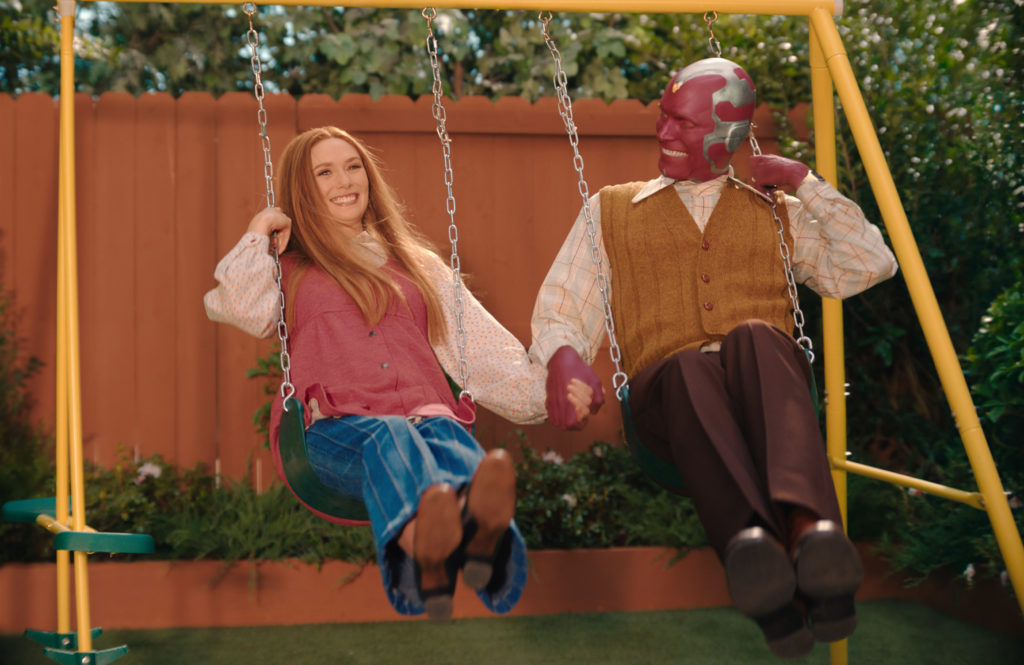
Sure, the fandom theorizing got a little out of hand at times, but that was a feature built into the show’s structure, for good or ill. All of those Easter eggs and callbacks were pretty much designed to get the show’s watchers online and slinging their thoughts. This is why any complaints about the show’s release schedule tend to miss the point of it. Yes, it was rough having what was essentially a kind of Marvel movie doled out in segments sometimes no more than 22 minutes per week, but there’s no denying that the show’s buzz has been insanely high and has only sustained itself over time in a way a binge-watch show can’t. The first episodes of WandaVision aired only three weeks after Bridgerton dropped, for instance. If there’s a problem with puzzle box shows on a traditional weekly schedule release, it’s that the online theories inevitably reach a critical mass of unlikelihood (See: Lost & Game of Thrones). If there’s backlash because the show didn’t indulge any of these theories (and may not have helped itself with the shenanigans surrounding hints that a Luke Skywalker-level character was due to make a guest appearance), we would urge a rewatch and ask people to observe how little the show promised and how much it became increasingly straightforward with each episode.
Which isn’t to say there aren’t fair criticisms to be made. As we noted in our review of the first few episodes, the sitcom pastiche only partially worked. The visuals and musical cues were insanely on point, but the early scripts never came close to the comedy of the originals. After all, with perhaps the possible exception of Full House (no tea no shade), all of the shows WandaVision paid homage to are largely considered among the greatest sitcoms of all time. To be fair, by the time the series hit the ’80s, it had found a certain balance of entertaining pastiche, genuinely funny performances, and cutaways to what was pretty much a straight-up Marvel movie. Agatha Harkness’s reveal at the end of the seventh episode’s Modern Family pastiche was the culmination of that perfect balance; moving the story straight into good-vs-evil territory, ramping up the special effects, and providing the campiest, most wildly entertaining 60 seconds we may get all year:
Not to rep for the bland corporatization of our mass entertainment, but “Agatha All Along,” written by the Grammy and Oscar winning team of husband and wife Robert Lopez and Kristen Anderson-Lopez (who gave you the earworm of 2013, Frozen‘s “Let It Go”), is what you get when you combine the richness of Marvel comic book characters with the creativity that Disney dollars can purchase. “Agatha All Along” singlehandedly placed Agatha Harkness in the dark pantheon of legendary Disney witch characters. She will also certainly become a drag queen mainstay in the months ahead.
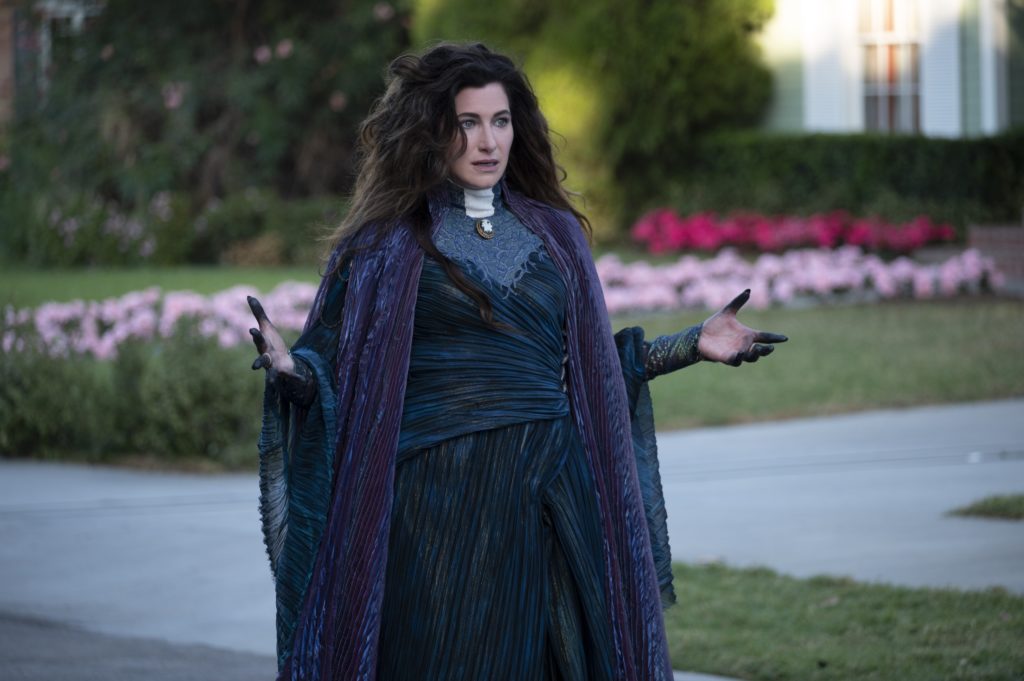
It’s also fair to critique the show for relying a bit too much on fan knowledge. You can watch WandaVision without having seen the first two Thor films, Ant-Man and the Wasp and Captain Marvel, but you’ll miss a good deal of the nuance and character references. You pretty much can’t watch the show without having seen the previous three Avengers films or you’ll miss roughly 75% of the references and backstory. But the Marvel machine has been outrageously good at translating the conventions of long-form comic book storytelling to the screen and WandaVision represents one of the most persistent styles of comic book narrative: the kind that pays back years of fan loyalty by picking up strands from a bunch of other stories and spinning something new out of it that redefines and centers a heretofore unrecognized or mistreated B-list character. Wanda’s story here doesn’t coincide exactly with her comic book version, but it tracks pretty closely with the superhero tradition of sidelined or mistreated female characters getting new life and new power breathed into them with a little bit of coaxing.
Wanda got an extended origin story; a turn that deepened her character but also darkened her at the same time. If you were to add up every appearance she made prior to this, it would amount to shockingly little in the literal grand scheme of the MCU. Now, she’s positioned as a much more defined character with a much more articulated story arc behind her and a wide open vista of narrative (and franchise-related) possibilities in front of her. Wanda’s vision of Vision is gone, but White Vision is out there with all of his memories restored. Agatha Harkness is sidelined, but on call should Wanda (or Disney) ever have need of her again (which seems likely given the overwhelmingly ecstatic response to Kathryn Hahn’s portrayal). Wanda’s magically created children were seemingly wiped out when her spell evaporated, but as the final post-credits scene implies, she’s working on a way to get them back. And because there was a swirl of dark prophesy surrounding her rebirth as the Scarlet Witch, there’s likely to be quite the response to her activities and growing power.
She did, after all, wind up torturing several thousand people and then skipping town to go teach herself how to be the most powerful witch of all time. Nothing exists in a vacuum in the MCU, not even hermetically sealed magically created realities. Given Elizabeth Olsen’s co-starring role in next year’s Doctor Strange in the Multiverse of Madness (as well as Agatha’s claim that the Scarlet Witch is more powerful than the Sorcerer Supreme), there is clearly a ton of narrative fallout to come from this semi-ending. Even so, Wanda ended the story in a more hopeful, powerful, and self-aware place than when she started and the future doesn’t have to be quite so dire for her. Westview-Vision did, after all, restore White Vision’s memories and may have also inserted his own in the process. And Wanda did, after all, hear the cries of her magically erased children while in full Scarlett Witch astral mode in the final post-credits scene.
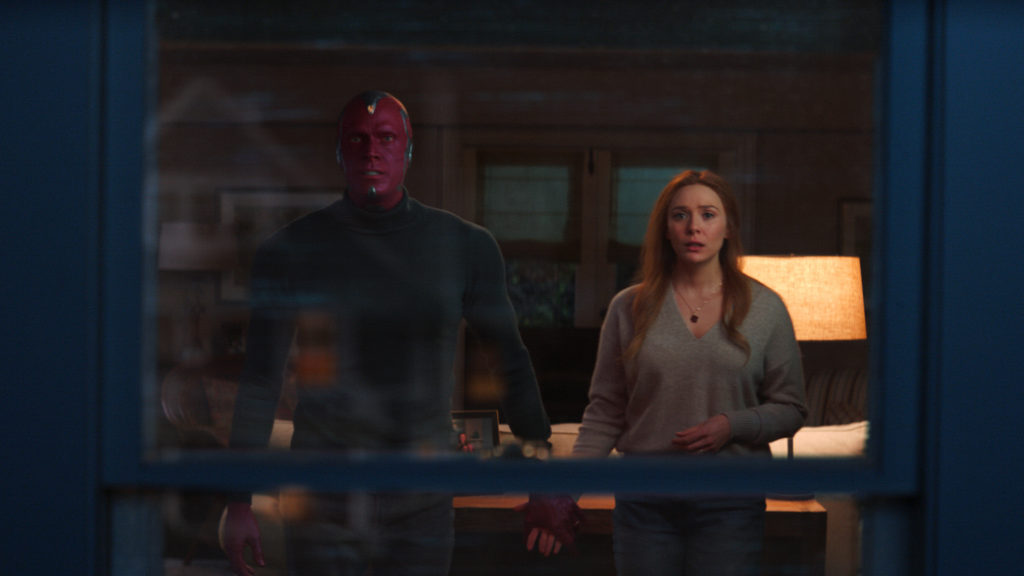
But for all the hints, red herrings and foreshadowing of future Marvel projects, WandaVision itself was always a story about one thing and one thing only: Wanda’s grief and her painful progression through the stages required to get to acceptance. It is to the creative team’s enormous credit that they stuck to the basic, utterly human concept that the only true “happy” ending for the grieving is to move on from it a stronger person. If she didn’t get quite the happy (or even definitive) ending audiences might have expected, she got the next best thing a Marvel Cinematic Universe can offer her: more story time. If anyone hoped for a more solid ending (not to mention one more emotionally satisfying for the main character), we can only return to Wanda’s own meta observation about the nature of storytelling when it intersects with genre conventions: “It’s not that kind of show.”
Paris Fashion Week: Loewe Fall 2021 Collection Next Post:
WERQ From Home: Kelly Marie Tran Promotes “Raya and the Last Dragon” in Monse
Please review our Community Guidelines before posting a comment. Thank you!



